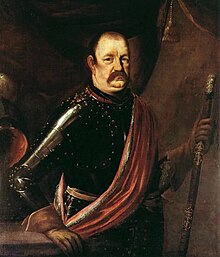Jerzy Sebastian Lubomirski
Jerzy Sebastian Lubomirski (* 20th January 1616 in Wiśnicz ; † 31 December 1667 in Breslau ) was a Polish aristocrat , magnate , politician , military leader , officials in the civil service as well as imperial princes in the Holy Roman Empire from the noble family of Lubomirski .
Life

Lubomirski was a famous Polish general during the Poland-Lithuania wars against the Zaporozhian Cossacks under Hetman Bogdan Chmielnicki , Tsarism Russia under Tsar Alexei , the Swedes under King Charles X Gustav and Transylvania under Prince George II Rákóczi in the years 1648-1660 .
He organized the resistance against the Swedish invaders in southern Poland in 1655. He fought back the troops of György II Rákóczy and marched into Transylvania in 1657, forcing the Transylvanian prince to surrender. In league with the Grand Hetman of the Crown, Stanisław "Rewera" Potocki , he defeated a Russian-Cossack army under the leadership of Vasily Sheremjetev in the battle of Tschudnow in 1660 and persuaded them to surrender.
He was a strong advocate of the Golden Freedom and the leader of the opposition to the Polish King John II Casimir and his reforms, including the Vivente Rege . In the fight against the royal family, he sought support from Austria and Brandenburg . At his instigation, the reform of the king's election fell through twice in the Polish diet , in 1660 and 1661. The king accused him of treason (alliances with foreign powers and general agitation against his own sovereign). He was finally ousted by a resolution of the Sejm in 1664. He lost all his offices and titles and went into exile in the Holy Roman Empire.
From Silesia (then part of the Kingdom of Bohemia) he made contact with the Roman-German Emperor, the Brandenburg elector and the Swedish royal family, with whom he concluded agreements directed against the Polish king and his reforms. He publicly presented himself as the protagonist of the Golden Freedom against the allegedly burgeoning absolutism in Poland. As part of the confederation named after him, he was able to pull part of the Polish aristocracy on his side and paralyze the Polish parliament through his sympathizers by means of the Liberum Veto . While Poland was still at war with Russia , he defeated the royal troops in several battles, for example at Czestochowa in 1665 and at Mątwy in 1666.
The Polish king, plagued by military defeats, was forced to give in to the demands of the rebels. In the Treaty of Łęgonice, 1666, he gave up his reform plans and thus indirectly laid the foundation for his voluntary abdication in 1668.
Lubomirski emerged stronger from the conflict with the king, but as a broken man he died alone and abandoned in exile in Silesia in 1667. His victory over the king in the Battle of Mątwy prevented essential key reforms in Poland-Lithuania 100 years before the First Partition of Poland in 1772. It was a turning point in both Polish and European history . Lubomirski's triumph over John II Casimir was only a Pyrrhic victory in the long term and founded the decline of the Polish statehood at the end of the 18th century by preventing reforms as early as the 17th century .
Family and social status
He was the son of the voivod and starost , Prince Stanisław Lubomirski and the Ruthenian princess Sofia Lubomirska, née Ostrogska . Since 1641 he was married to Konstancja Ligęza. After her death, he married Barbara Tarło in 1654. Several sons and daughters sprang from both marriages, including Hieronim Augustyn Lubomirski .
As a civil servant he was u. a. Starost of Kraków and Court Marshal of the Crown since 1647, Grand Court Marshal of the Crown since 1650, Field Hetman of the Crown and Starost of Nowy Sącz and Spiš since 1658.
literature
- Constantin von Wurzbach : Lubomirski, Georg Sebastian . In: Biographisches Lexikon des Kaiserthums Oesterreich . 16th part. Kaiserlich-Königliche Hof- und Staatsdruckerei, Vienna 1867, pp. 110–112 ( digitized version ).
- Jerzy Jan Lerski: Historical Dictionary of Poland, 966-1945 , p. 314
- Bibliografia Literatury Polskiej - Nowy Korbut , t. 2 Piśmiennictwo Staropolskie , Państwowy Instytut Wydawniczy, Warszawa 1964, pp. 467-470.
- W. Kłaczewski: Jerzy Sebastian Lubomirski , Wrocław 2002, wyd. Ossolineum, ISBN 83-04-04592-3 .
Individual evidence
- ↑ Jerzy Jan Lerski: Historical Dictionary of Poland, 966-1945 , p. 314
| personal data | |
|---|---|
| SURNAME | Lubomirski, Jerzy Sebastian |
| BRIEF DESCRIPTION | Polish Szlachcic, magnate, politician and military leader |
| DATE OF BIRTH | January 20, 1616 |
| PLACE OF BIRTH | Wiśnicz |
| DATE OF DEATH | December 31, 1667 |
| Place of death | Wroclaw |
